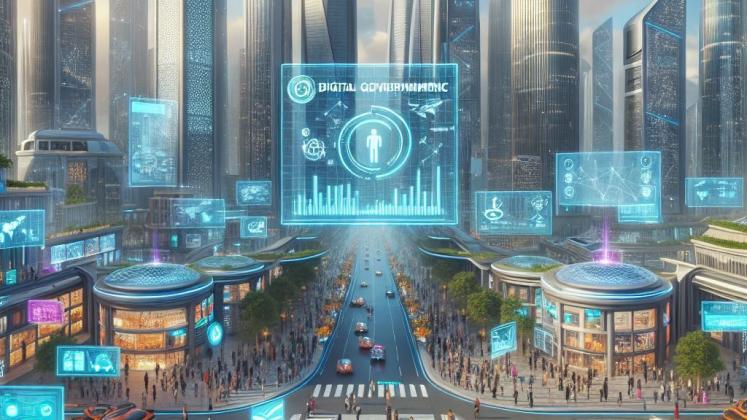As UNU approaches its 50th anniversary in 2025, we asked a popular generative Artificial Intelligence (AI) tool to imagine the future of digital governance. How might citizens interact with Governments and the Public Sector 50 years from now? Here is the scenario created by AI.
Imagine it’s the year 2074. The interaction between citizens and governments has profoundly transformed and is driven by technological advancements and evolving governance models.
Citizens now interact with government services through immersive digital platforms, using virtual reality (VR) and augmented reality (AR). These platforms provide a highly intuitive and engaging experience, allowing citizens to navigate government services as if they were in a physical office but from the comfort of their homes.
A universal digital identity is the cornerstone of all interactions with the public sector. This secure, blockchain-based identity is used globally, ensuring seamless access to services regardless of location. It stores personal data securely, allowing citizens to instantly verify their identity and access services.
Artificial Intelligence (AI) plays a crucial role in facilitating interactions. AI-powered personal assistants help citizens navigate complex bureaucratic processes, answer queries, and provide personalised recommendations. These assistants are available 24/7, ensuring citizens can access support whenever needed.
Governance has become more participatory and decentralised. Citizens have the ability to vote on policies and local issues directly through secure, blockchain-based voting systems. This direct democracy approach empowers citizens to have a more active role in decision-making processes.
Smart cities equipped with the Internet of Things (IoT) enhance the interaction between citizens and public services. IoT devices monitor and manage urban infrastructure, providing real-time data to both citizens and government officials. This enables more efficient management of resources and quicker responses to issues.
Public services are highly personalised, thanks to big data and AI advancements. Governments use predictive analytics to anticipate citizens’ needs and provide tailored services. For example, AI can identify when a citizen might need social assistance and automatically enrol them in the appropriate programs. AI-powered chatbots and virtual assistants provide instant support and information, making government services more accessible and efficient.
Transparency is a key feature of government operations. Open data initiatives have made government activities and spending visible to all, fostering greater accountability. Blockchain technology ensures that all transactions and records are tamper-proof, building trust between citizens and the government.
Efforts to bridge the digital divide have succeeded, with universal access to high-speed internet and digital literacy programs ensuring that all citizens can participate in the digital economy. Global initiatives ensure that even the most remote and underserved communities are connected and empowered.
In 2074, the interaction between citizens and governments is characterised by immersive digital platforms, universal digital identities, AI-powered personal assistants, direct participation, smart city integration, personalised services, enhanced transparency, and a bridged digital divide. These advancements have created a more connected, efficient, and inclusive governance system, empowering citizens and fostering a collaborative relationship with the public sector.
AI's predictions for the next 50 years appear overly conservative and unambitious. We believe the futuristic scenario it outlines could be achievable in most countries within a much shorter timeframe, perhaps even in the next decade or two.
While the potential of digital governance holds great promise, it comes with significant challenges and controversies that require immediate attention, such as ensuring data privacy, bridging the digital divide, and addressing ethical concerns in an AI-driven government. These issues require a multidisciplinary approach and strong international cooperation. Many regions in the Global South face barriers to digital transformation, including a lack of necessary infrastructure, limited affordable internet access, and low digital literacy rates. Overcoming these obstacles requires significant investment and international support.
Over the past decade, UNU-EGOV has substantially contributed to advancing digital governance, especially in countries facing significant digital transformation challenges. UNU-EGOV's core activities of research and education, capacity building, consultancy and advisory service, and global collaboration, ensure that the benefits of digital transformation are shared equitably worldwide, aligning with the Sustainable Development Goals (SDGs). As we look to the future, UNU-EGOV's role is increasingly critical in shaping an inclusive, responsible and sustainable Global digital Governance landscape.




